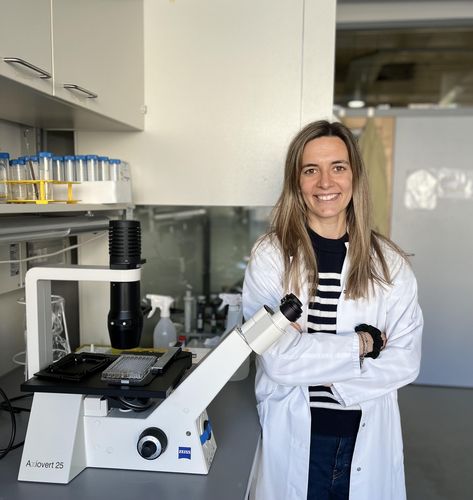Name: Beatriz Blanco-Redondo
Born in: Barcelona, on: Mai 1985
What I studied: I studied biomedicine at the University of Barcelona, then I moved to Würzburg where I did my master and my PhD. Shortly after that I moved to NYC, USA to Columbia University where I did my postdoc.
At Leipzig University I’m working at: Rudolf Schönheimer Institute of Biochemistry
My current research project: Currently we are characterizing newly identified adhesion GPCRs in Drosophila melanogaster.
Where do you live in Leipzig and how do you like it?
I live in Südvorstadt and I love it there, it is full of restaurants, bars and young people and it is very close to the city.
Why are you in Leipzig? (Please give a brief description of your research project / position)
I´m a junior group leader at the Rudolf-Schönheimer-Institut (RSI) für Biochemie in the group of Prof. Langenhan. I joined in September of 2017 and we are currently characterizing newly identified adhesion G protein-coupled (aGPCRs) receptors in Drosophila melanogaster. We have some genes, which are known to share some hallmarks of the aGPCRs and we are trying to understand their physiological profiles in different tissues and cell types and identify which signalling pathways thess mysterious surface receptors follow.
What fascinates you personally about this research project? What do you value the most about your work?
aGPCRs are involved in many processes but most of them are still orphan receptors, meaning that barely nothing is known about them (ligands, pathways…) that is what makes the research on aGPCRs so fascinating because everything you find will be new knowledge for the research community.
Is there anything you especially like about the University and/or the city of Leipzig?
Everybody has been very nice and welcoming here. I love the city, it is a big city but still feels nicer than some other bigger cities like Berlin or Munich because everything it is close by here.
Feel free to answer with a personal reference or in general. What discovery, invention or knowledge would you like to have in the next ten years?
In January 2022, an important research article in Nature Medicine came out in which I´m one of the first authors. There, we describe how we could translate bench science to clinical trials in the context of ALS (Amyotrophic lateral sclerosis). That is the biggest dream for a medical scientist, to be able to help people at the end and I would like to continue helping patients and developing treatments for diseases.
What do you like to do in your free time?
Travel and spend time with my family and friends
Do you have a motto in life that helps you through tough times?
Be always positive and smile
Thank you.

Comments
No comments found!